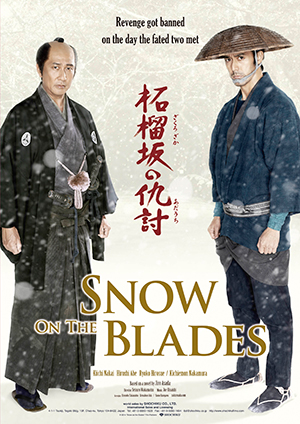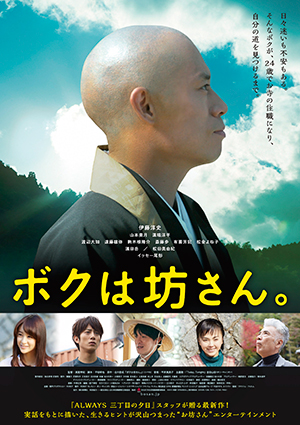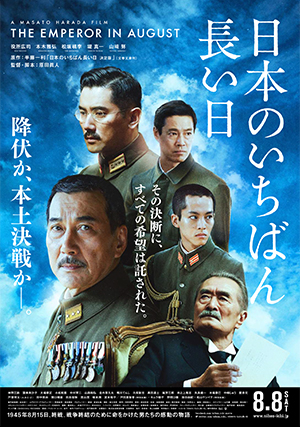 |
Sugihara Chiune (139 min) (2015)
杉原千畝 スギハラチウネ
Persona Non Grata
Persona Non Grata tells the story of Chiune Sugihara, the courageous Japan diplomat who defied his government and issued visas in 1940 to over 6,000 Jews, saving them from certain death in Nazi concentration camps. For his actions, he was dismissed from the Foreign Ministry after the war and lived in obscurity.
杉原千畝は、英語、ロシア語、ドイツ語、フランス語など数カ国語を操るインテリジェンス・オフィサーとして、満洲、フィンランド、リトアニア、ドイツ、チェコ、ルーマニアなど様々な国に滞在。身の危険を冒しながら、混沌とする世界情勢の情報を収集し、日本に発信し続けていた。そのため、当時のソ連から警戒され【ペルソナ・ノン・グラータ(好ましからざる人物)】に指定された日本初の外交官でもあった。
|
|
 |
Biri Gyaru (117 min) (2015)
ビリギャル~学年ビリのギャルが1年で偏差値を40上げて慶應大学に現役合格した話
Flying Colors: How a Teen Girl Went from Academic Absurdity to an Elite University in One Amazing Year
Nominated for four Japanese Academy Awards, including Best Actress, Best Supporting Actor, and Best Supporting Actress, Biri Gyaru / Flying Colors is based on the true story of Sayaka, a high school sophomore whose academic level is equivalent to that of a fourth-year elementary student. She doesn't know north from south, or even that the earth is round. Then a meeting with the teacher at a “cram school” leads to her taking on the seemingly impossible goal of gaining entrance to the prestigious Keio University.
名古屋の女子校に通う工藤さやか(有村架純)は、母の勧めで学習塾に入ることに。勉強にまったく関心がなく、偏差値は30、小学校4年生レベルの学力しかないさやかだったが、講師の坪田(伊藤淳史)と二人三脚で慶應大学現役合格を目指す。
|
|
 |
Zakuro Zaka no Adauchi (119 min) (2014)
柘榴坂の仇討
Snow on the Blades
Zakuro Zaka no Adauchi tells the story of Shimura Kingo, the personal bodyguard to Ii Naosuke, the Chief Minister of the Tokugawa Shogunate. After he fails to prevent his master’s assassination at the hands of rebels opposed to Japan’s opening to the West, Kingo embarks on a 13-year journey to avenge the murder. Even as Japan changes around him, Kingo continues to cling to the spirit and values of the samurai.
By 1873 only one of the assassins, Sabashi Jubei, remains alive. Ironically, on the very day that Kingo learns of Jubei’s whereabouts, the Meiji Government promulgates a law banning avenge killings. But no law can prevent Kingo’s determination to fulfill his sacred duty. After 13 years, Shimura Kingo and Sabashi Jubei meet again -- on the Pomegranate Incline (Zakuro Zaka).
安政七年(1960年)。時の大老・井伊直弼に仕える彦根藩士の志村金吾。桜田門外で暗殺者集団の襲撃を受けた際、直弼の警護役を務めながらその命を守りきることができなかった。その失態を恥じた両親は自害するも、自身は切腹を許されず、逃亡した水戸浪士を討ち取れとの藩命が下る。以来、献身的な妻セツに支えられ、仇を捜し続ける日々を送る。それから13年、時代は明治へと変わり、武士の世は終わりを告げ、彦根藩もすでにない。にもかかわらず、金吾の仇討ちへの執念は揺らぐことはなかった。そしてついに、18名の刺客の最後の生き残り、佐橋十兵衛の居場所を知る金吾だったが…。
|
|
 |
Boku wa Bosan (99 min) (2015)
ボクは坊さん。
I am a Monk
At times light-hearted and other times serious, this heart-warming film provides a rare look inside the everyday lives of Japanese monks. With the sudden death of his grandfather, a 24-year old bookstore clerk, Koen Shirakata, becomes an Abbot of Eifukuji, the 57th of 88 temples on the Shikoku pilgrimage route. Although he was born and raised in this temple, stepping into the Buddhist world as a monk is a much deeper experience than Koen ever imagined.
Even as he worries about his new relationship with worshippers of the temple, Koen conducts weddings and funerals, and also acts as the “face” of the community. As he observes people’s lives and deaths, it is a natural part of the job to ponder the meaning of life and death.
白方光円、24歳。突然の祖父の死をきっかけに、四国八十八ヶ所霊場、第57番札所・栄福寺の住職になったばかり。この寺で生まれ育ったけれど、住職として足を踏み入れた“坊さんワールド”は想像以上に奥深いものだった!
初めて見る坊さん専用グッズや、個性豊かな僧侶との出会いにワクワクしたり、檀家の人たちとの関係に悩んだり。お葬式や結婚式で人々の人生の節目を見守るのはもちろん、地域の“顔”としての役割もある。職業柄、人の生死に立ち合うことで“生きるとは何か? 死ぬとは何か?”と考えたりもする。坊さんとしての道を歩み始めたばかりの光円に何ができるのか。何が伝えられるのか。光円は試行錯誤を繰り返しながら、人としても成長していく……。 |
|
 |
Nihon no Ichiban Nagai Hi
日本のいちばん長い日
The Emperor in August
Nihon no Ichiban Nagai Hi has been nominated for eleven Japanese Academy Prizes, including Best Picture, Best Director, Best Actor, and Best Screenplay. It provides a “behind-the-scenes” look at the tensions within the Japanese Government as the senior leadership, including the Emperor, debated whether to accept the Potsdam Declaration and surrender. Even after the atomic bombs were dropped on Hiroshima and Nagasaki, the Emperor’s Cabinet remained split. Some were prepared to continue the fight, even if it meant the destruction of Japan.
That is when the Emperor did the “unthinkable” and broke the impasse by expressing his own views. “Continuing the war, destroying civilization, and bringing sorrow on humanity is not my wish. Whatever may happen to my person, I desire to save the lives of my people.”
Despite the Emperor’s decision, a group of young Army officers, determined to fight to the end, mount a coup d’etat against the Imperial Palace to prevent the broadcast of the Emperor’s speech announcing Japan’s surrender….
1945年7月。太平洋戦争での戦況が悪化する日本に対して、連合軍はポツダム宣言の受託を迫る。連日にわたって、降伏するか本土決戦に突き進むかを議論する閣議が開かれるが結論を一本化できずにいた。やがて広島、長崎に原爆が投下され、日本を取り巻く状況はさらに悪くなっていく。全国民一斉玉砕という案も取り沙汰される中、阿南惟幾陸軍大臣(役所広司)は決断に悩み、天皇陛下(本木雅弘)は国民を案じていた。そのころ、畑中健二少佐(松坂桃李)ら若手将校たちは終戦に反対するクーデターを画策していた。
|
|